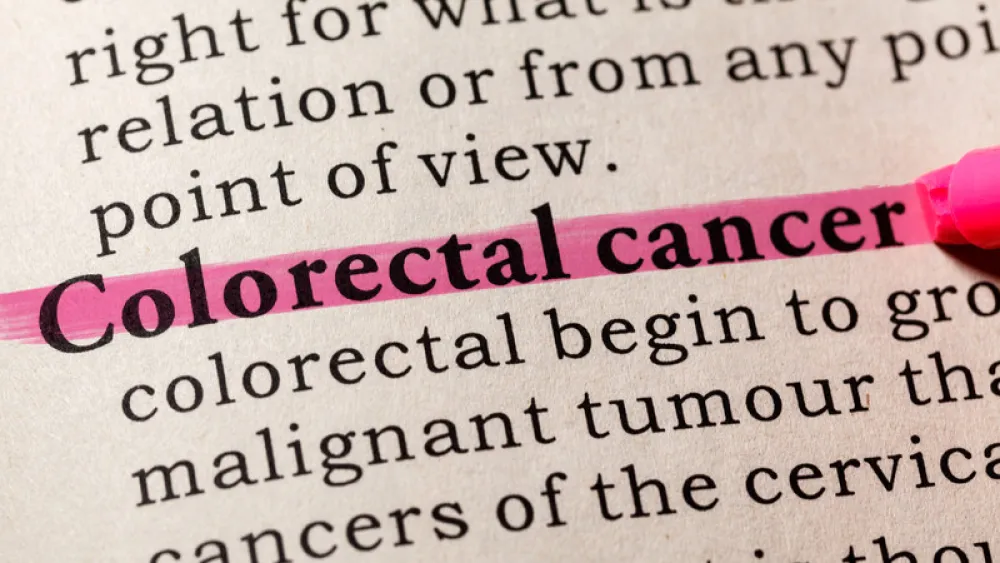Today's Medicine
The Importance of Colorectal Cancer Screening
Published: March 2, 2023

Colorectal cancer screening is an essential tool in cancer prevention, and the U.S. Preventive Services Task Force recommends routine colorectal cancer screening for adults starting at age 45.
The goal of screening is to find and identify polyps – abnormal tissue growths – in the colon. Polyps are the most common causes of colon cancer. Screening allows doctors to identify and remove these polyps before they develop into cancer.
Unfortunately, we’re not where we need to be with colorectal cancer screening rates. In 2020, 71.6% of U.S. adults age 50 to 75 were up to date with screening. That means millions of people are behind on screening – and we know that many adults delayed or skipped routine screening during the COVID-19 pandemic.
Screening Recommendations
Need a colorectal cancer screening refresher? Recommendations include:
- Adults age 45 to 75 should be regularly screened
- Adults age 76 to 85 should ask their provider if they should be screened
- Adults over age 85 should not be screened
You may need to be screened before age 45 if you have:
- A history of colorectal cancer or certain types of polyps
- A family history of colorectal cancer
- A history of inflammatory bowel disease
- A hereditary colorectal cancer syndrome
- A history of getting radiation to the belly or pelvic area to treat cancer
Talk to your provider about when you should begin colorectal cancer screening. Colorectal cancer is a leading cause of cancer-related deaths in the U.S. and causes more than 50,000 deaths each year. But when caught early, it’s highly treatable.
Screening Options
How often you get screened for colorectal cancer depends on the type of screening. You and your provider will determine which type of testing is most appropriate for you based on your health and medical background. Positive results from stool testing, flexible sigmoidoscopy and CT colonography would require further diagnostic procedures.
Colonoscopy
The major benefit of a colonoscopy, the most common screening tool, is that it’s the only test that can directly visualize the entire length of the colon. During this test, providers can collect samples of tissue for biopsy and remove any polyps. We recommend patients have this test once every 10 years. If a lesion is found, your provider may recommend repeat testing even sooner. They will also recommend a colonoscopy if any other screening test you take is found to be positive.
Stool Testing
From the comfort of home, a patient collects a stool sample, which is sent to and tested in a laboratory. The lab works to determine if there is any evidence of abnormality that may indicate the presence of a polyp or cancer. In the past, the most common test looked for evidence of blood. Newer, more sensitive testing can now look for altered DNA that can be seen with colon cancer and certain types of polyps.
Stool testing is done every one to three years depending on the type of test. There are many types of home stool testing kits. Check with your provider to see if they have a preference.
Flexible Sigmoidoscopy
The least used screening test is sigmoidoscopy. It’s similar to colonoscopy in that it also utilizes a flexible tube to inspect the inside of the colon. However, only about half of the colon can be visualized with this scope. This test may miss lesions or polyps in the other parts of the colon. Because of this, sigmoidoscopy is generally done every five years and should be used in conjunction with stool testing.
CT Colonography (Virtual Colonoscopy)
A newer but not yet frequently utilized option is CT colonography. By using X-ray and CT imaging, this method creates a virtual view of your colon. If an abnormality is seen, a colonoscopy will generally be recommended for follow-up. If clear, this option can be repeated every five years.
Convenient Testing
Speak with your provider to determine which test is best for you. They’ll want to have a thorough discussion regarding the risks and benefits of each test. Regardless of which test you choose, it's important to remember that the best test is the one that gets done.
More Resources
- Need a primary care provider? Find a health partner who’s right for you.
- Learn more about colorectal surgery at Methodist.
- Learn about screening recommendations for other cancers.


